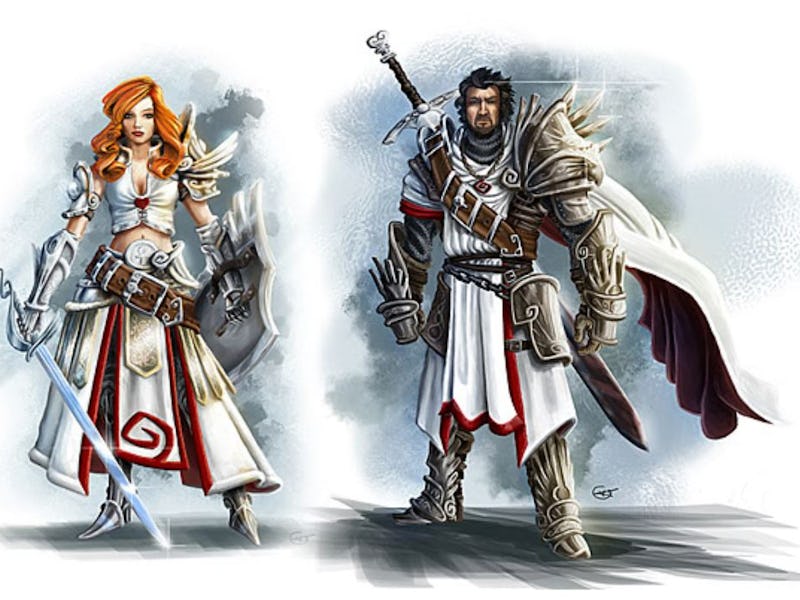10 Years Ago, Larian Studios Got Lucky
We wouldn’t have Baldur’s Gate 3 without this overlooked RPG.

Luck is what happens when preparation meets opportunity. These immortal words from the Roman stoic Seneca have been paraphrased and re-opted into motivational speeches for years. Clearly, Seneca was on to something. When we see amazing, seemingly overnight success it feels a lot like luck — like something that happened by chance. Reality is far more complex. And few game studios traffic in complexity as well as Larian, the minds behind last year’s smash-hit Baldur’s Gate 3.
The preparation for Baldur’s Gate 3 began 10 years ago with Larian’s release of Divinity: Original Sin. Set as a prequel to the studio’s main franchise, Divinity: Original Sin was a departure from the action-adventure of the series to a more robust role-playing game. With deep, branching decision trees, tactical turn-based combat, loads of intra-party mechanics (including co-op), and a sprawling game world full of possibilities, Divinity: Original Sin laid the groundwork for the formula that made BG3 a bestselling sensation. It also nearly destroyed the studio in the process.
Larian today is a lot different from Larian a decade ago. Divinity: Original Sin put the studio on the map, but fans rarely understand the hardships required for small studios to develop their ambitions. For Larian, it meant a number of tough choices. To start, the team decided to launch a concurrent project, Divinity: Dragon Commander, before it was ready because Larian was desperate for funds and needed to consolidate the manpower of its 30-person team.
Additional fundraising came from courting investors and a Kickstarter that smashed its goals and raised nearly $1 million. According to studio founder Swen Vincke, the studio had about €1.5 million in the warchest for developing Divinity: Original Sin and anticipated needing another €1.5 million to finish it. By the time it was finished, the studio spent nearly double that amount and used every possible trick at its disposal, including dodging tax payments, to put it all together.
It proved to be a wise investment in more ways than one. Anyone who has played Baldur’s Gate 3, Divinity: Original Sin or its sequel, knows that Larian goes hard when it comes to player agency and scalability. These massive games are powered by the Divinity engine, an in-house software developed for Divinity: Original Sin. It was a huge undertaking for a small studio, but once completed gave them the tools they needed to achieve their vision and, fortuitously, to build similar games in the future.
Larian included the Divinity Engine for some Kickstarter backers, enabling them to use the software for mods, custom campaigns, and more.
Divinity: Original Sin was our first glance at what would define Larian Studios. Many fans remember when they fell in love with Larian’s emergent, “yes and” approach to RPGs. Mine came during my first Divinity: Original Sin playthrough. I needed to get into a locked door but had accidentally slaughtered an NPC hours earlier who would’ve helped me get the key. I was clicking around in frustration when I noticed the door had an HP meter. Surely I couldn’t … ? Yes, I could. I hacked at the door until my sword broke, then bought a whole bunch of cheap swords and kept going until I was in.
Combat has a similar freedom. There are lots of environmental interactions at play. Some are obvious (water stops fire) and others not-so-obvious (cast fire on an enemy in a pool of blood and they take steam damage). Save scumming your way through trial-and-error takes the sting out of the toughest fights. I kept losing a particularly tough battle until I realized I could haul barrels from all around the level and set up some cover for myself before triggering the encounter. Some studios ask “Why?” but Larian defaults to “Why not?”
This splitscreen shows the ambitious co-op play in Divinity: Original Sin.
If the cornucopia of thirsty BG3 memes hasn’t tipped you off yet, Larian stuck the landing when it came to character work. This was an evolution from Divinity: Original Sin which did not feature any romance options for party members, and tends to put its narrative juice into many, many intricate NPC interactions. If you love being rewarded with random skill checks like “can talk to animals” then you’ll love Divinity: Original Sin.
You won’t be the only one. Larian’s all-in financial strategy paid off big time. In addition to dozens of awards, Divinity: Original Sin sold nearly 200k copies at launch and moved 500k its first four months. To date it’s sold around 2.5 million copies. Impressive, but its real legacy lies in setting the stage for the sequel, Divinity: Original Sin 2 which has sold around 7 million, and Baldur’s Gate 3 which moved a whopping 15 million. That’s a lot of taxes to pay, too.